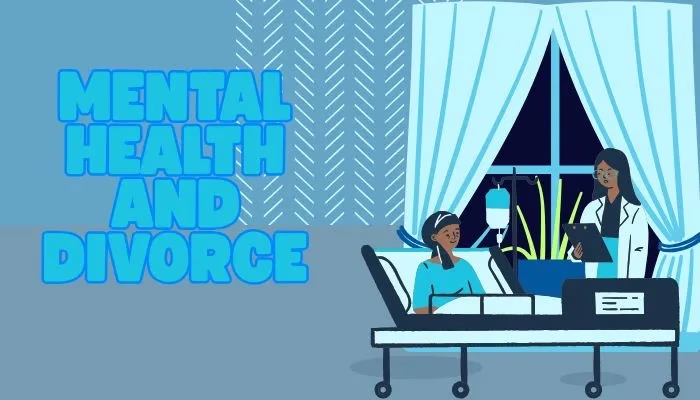
Divorce isn’t permanently the most legal breakup—it strongly affects emotional well-being, psychological safety, and social fitness. When connections break down, the inner charge can be huge, frequently activating anxiety, distress, and placing ignorance. This emotional breakdown affects not just the partners but also their circles, families, children, and social connections. Mental health and divorce are closely linked, as the pressure of disconnection can regulate both changing frame of mind and long-period mental fitness. By understanding this connection, people can better manage and heal. Controlling a breakup with love, knowledge and care of psychological health is necessary for healing.
Divorce Mental Health: Emotional Impact of Separation
When couples separate, the emotional outcomes can be extreme and continue. Divorce and Mental health frequently demands low mood, anger, and hesitation, making it difficult to cross everyday life. Moreover, people may experience mood changes, difficulty in focus, and even sleep disturbances.
- A state of extreme struggling can cause feelings of sadness, neglect, rejection and loneliness.
- Low spirits and anxiety frequently go after the breakdown of a long-period connection.
- The stress of disputes can increase psychological situations.
- Uncertainty about the future put up emotional insecurity.
Clearly, the mental stress of divorce needs timely emotional care and help to promote healing.
Mental Health and Divorce: Effects on Self-Value
For many, divorce brings a big setback and difficulties of identity and self-value. Development, from being part of a couple to being alone can feel like losing a part of ownself. As a result, mental health and divorce cross holding hands when it comes to self-respect challenges.
- People may question their personal value or decision-making ability.
- Feelings of defeat frequently come out when a relationship ends.
- Sadness, loneliness can also affect looking for proof in dangerous strategies.
- Restructuring a personal identification takes time and emotional work.
Therefore, improving emotional flexibility is necessary to regain confidence and balance after a breakup.
Mental Health and Divorce: Children and Family Dynamics
Divorce doesn’t just affect the partners—it also significantly disrupts family circles, especially for kids. The connection between mental health and divorce becomes even more evident when children are caught in the middle.
- Children may develop behavioral issues or academic struggles due to instability.
- Constant tension between parents can cause emotional distress in young minds.
- Adjusting to new routines or living arrangements adds further stress.
- Communication, relations breakdown can increase emotional wounds in the family circle.
Hence, Joint custody help and intellectual fitness counseling for kids become necessary during this phase.
Detachment and Loneliness and Loneliness
While divorce might bring comfort from struggle, it also frequently results in decreased social reaction. Many people withdraw from friends and family or feel embarrassed to share their personal struggle. The relationship between mental health and divorce includes the isolating effects of post-separation life.
- Friends may “take sides,” leaving one partner feeling excluded.
- Loss of a shared personal life on social systems can increase feelings of sadness and isolation.
- Weekend loneliness or other holidays can make emotional emptiness.
- Dating again can be scary and emotionally clearing.
Thus, keeping or restructuring social connections is a key part of emotional healing.
Coping Strategies and Emotional Recovery
Despite the problems, it is possible to heal and restructure after divorce. Focusing on mental health and emotional flexibility is necessary for a smoother recovery. Understanding that mental health and divorce need practical get on mechanisms can empower people to regain control of their lives.
- Seek treatment or counseling for emotional clarity and help.
- Engage in self-care routines like daily record, exercise, or mindcare.
- Come back with friends and community connections to keep away from isolation.
- Set future goals and take small steps toward rebuilding life.
Thus, accepting these tools and habits can change a painful ending into a new start.
Mental Health and Divorce: Help Systems and Therapy Options
Gaining emotional help is frequently the most reproving step in processing divorce. When looking at intellectual health and divorce, therapy plays an altering role in restructuring psychological well-being.
- Cognitive Behavioral Therapy helps manage negative feeling patterns.
- Group treatment allows people to share facing stories and educate others.
- Online support communities offer anonymous, flexible interaction.
- Professional guidance can help in crossing the dispute of shared child custody and related pressures.
Ultimately, asking for help is a power—not a weakness and necessary for emotional healing.
Mental Health and Divorce: Long-Term Psychological Effects
Although many get better fully, others face long-lasting emotional wounds. The continued link between mental health and divorce is apparent in those who never fully process their grief or trauma.
- Chronic depression may develop if emotions remain suppressed.
- Trust issues can carry over into future relationships.
- Physical health may decline because of long period stress and rejection.
- Emotional detachment might become a shift for oneself.
To prevent long-period effects, it is necessary to talk about emotional pain early and continuously.
Building a New Life with Positivity
Despite the demanding situations, divorce can be a new start filled with growth and healing. Approaching life with a renewed focus on mental fitness and divorce motivates personal development and emotional equality.
- Accept activities or interests previously set aside.
- Explore personal growth by way of learning and practice, or retreats.
- Celebrate small achievements, like emotional clarity or improved self-value.
- Showing tolerance, kindness and practicing forgiveness of self and others—to move forward peacefully.
Therefore, finding which means in after breakup lifestyles isn’t best but empowering.
Conclusion: Healing Through Mental Health and Divorce Awareness
In conclusion, mental health and divorce are mixed up when it comes to personal well-being. From emotional fixedness of identity shifts and social isolation, the psychological impact of breakup is deep. Yet, with proper help, facing strategies, and a proactive approach to healing, people can control the pain and restructure themselves. Prioritizing emotional and psychological health during and after divorce ensures a more constructive path forward—and a hopeful future.
Disclaimer
This article, “Divorce and Mental Health,” is for informational and educational purposes only. It is not intended to replace professional diagnosis, treatment, or medical advice.
